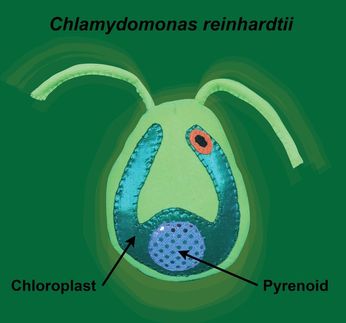Automation technology facilitates large-scale biomass cultivation using artificial photosynthesis
Q.ANT and Festo agree strategic partnership
Festo and Q.ANT, a wholly owned subsidiary of TRUMPF, are entering into a strategic partnership to cultivate biomass on an industrial scale. The two companies aim to achieve this using a combination of automation technology from Festo and quantum technology from Q.ANT. algae offers significant potential in this context.
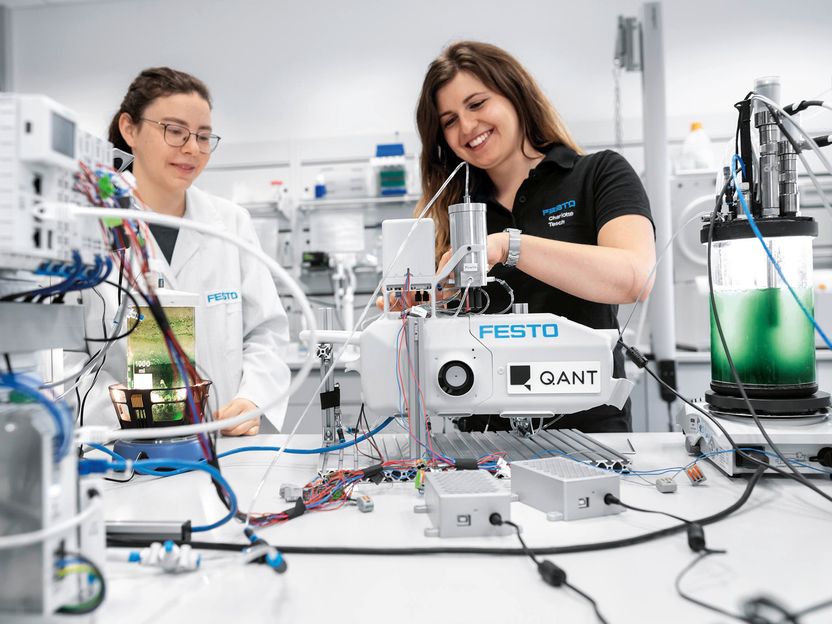
The Festo developer connects the microfluidic pumps to the Q.ANT sensor to supply the algae fluid.
Festo SE & Co. KG
Algae are tiny climate-change fighters
Algae have an extremely high photosynthetic efficiency in their natural environment, binding ten times more carbon dioxide (CO₂) than land plants. When algae are grown in bioreactors equipped with appropriate sensors, control technology and automation, this efficiency can be increased even further, reaching a hundredfold that of land plants. The substances created in this process can be used as raw materials for pharmaceuticals, packaging and cosmetics and, ultimately, recycled in ways that create a climate-neutral system. This gives algae considerable potential to drive the circular economy.
“We aim to make a decisive contribution toward improving quality of life for both current and future generations. Our automation technology and expertise in control engineering make us the perfect partner for large-scale biomass cultivation,” says Prof. Volker Nestle, Head of LifeTech Product Development at Festo. “Our goal is to develop materials that will be easier to compost in the future. This opens up a whole new chapter in our Bionic Learning Network.”
Festo prototype at Hannover Messe
One of the biggest challenges lies in accurately determining the amount of biomass. To do this, Festo relies on quantum sensor technology from Q.ANT. “Our quantum-based particle sensors open the door to new processes, applications and industrial products. Using this technology for industrial photosynthesis is a great way to demonstrate how much potential it offers for the future,” says Dr. Michael Förtsch, CEO of Q.ANT. A prototype of a system with quantum technology will be presented at Hannover Messe 2022.
Quantum sensor enables cell measurements
The Q.ANT sensor provides precise, real-time information on the organisms’ growth. To obtain this information, algae are conveyed to the sensor automatically and continuously through special microfluidic components made by Festo, such as pumps that can handle extremely small quantities of liquids with outstanding precision. The quantum sensor is able to optically analyze individual cells in order to precisely determine the amount of biomass. It also checks the cells’ vitality with the help of artificial intelligence. Only then is it possible to respond proactively to process events and take steps to regulate them.
Most read news
Other news from the department business & finance
These products might interest you
 New
New
Flexcell Zelldehnungsbioreaktoren für zelluläre Biomechanik-Anwendungen by Dunn
Cell Stretching Bioreactors for Life Science Research
Used in over 1300 laboratories worldwide, and cited in over 9000 research publications

Biostat STR by Sartorius
Biostat STR Generation 3 Bioreactors
Engineered for Ultimate Upstream Performance
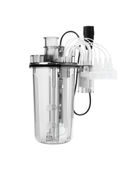
Ambr® 250 HT Consumables by Sartorius
Efficient bioprocesses with single-use bioreactors
Minimise cleaning effort and maximise flexibility for cell and microbial cultures
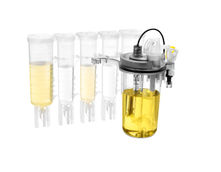
Ambr® 250 Modular by Sartorius
Mini bioreactors for cell and gene therapies with high scalability
Maximise your process development with reliable single-use vessels

Get the life science industry in your inbox
By submitting this form you agree that LUMITOS AG will send you the newsletter(s) selected above by email. Your data will not be passed on to third parties. Your data will be stored and processed in accordance with our data protection regulations. LUMITOS may contact you by email for the purpose of advertising or market and opinion surveys. You can revoke your consent at any time without giving reasons to LUMITOS AG, Ernst-Augustin-Str. 2, 12489 Berlin, Germany or by e-mail at revoke@lumitos.com with effect for the future. In addition, each email contains a link to unsubscribe from the corresponding newsletter.
Most read news
More news from our other portals
Something is happening in the life science industry ...
This is what true pioneering spirit looks like: Plenty of innovative start-ups are bringing fresh ideas, lifeblood and entrepreneurial spirit to change tomorrow's world for the better. Immerse yourself in the world of these young companies and take the opportunity to get in touch with the founders.
See the theme worlds for related content
Topic World Cell Analysis
Cell analyse advanced method allows us to explore and understand cells in their many facets. From single cell analysis to flow cytometry and imaging technology, cell analysis provides us with valuable insights into the structure, function and interaction of cells. Whether in medicine, biological research or pharmacology, cell analysis is revolutionizing our understanding of disease, development and treatment options.
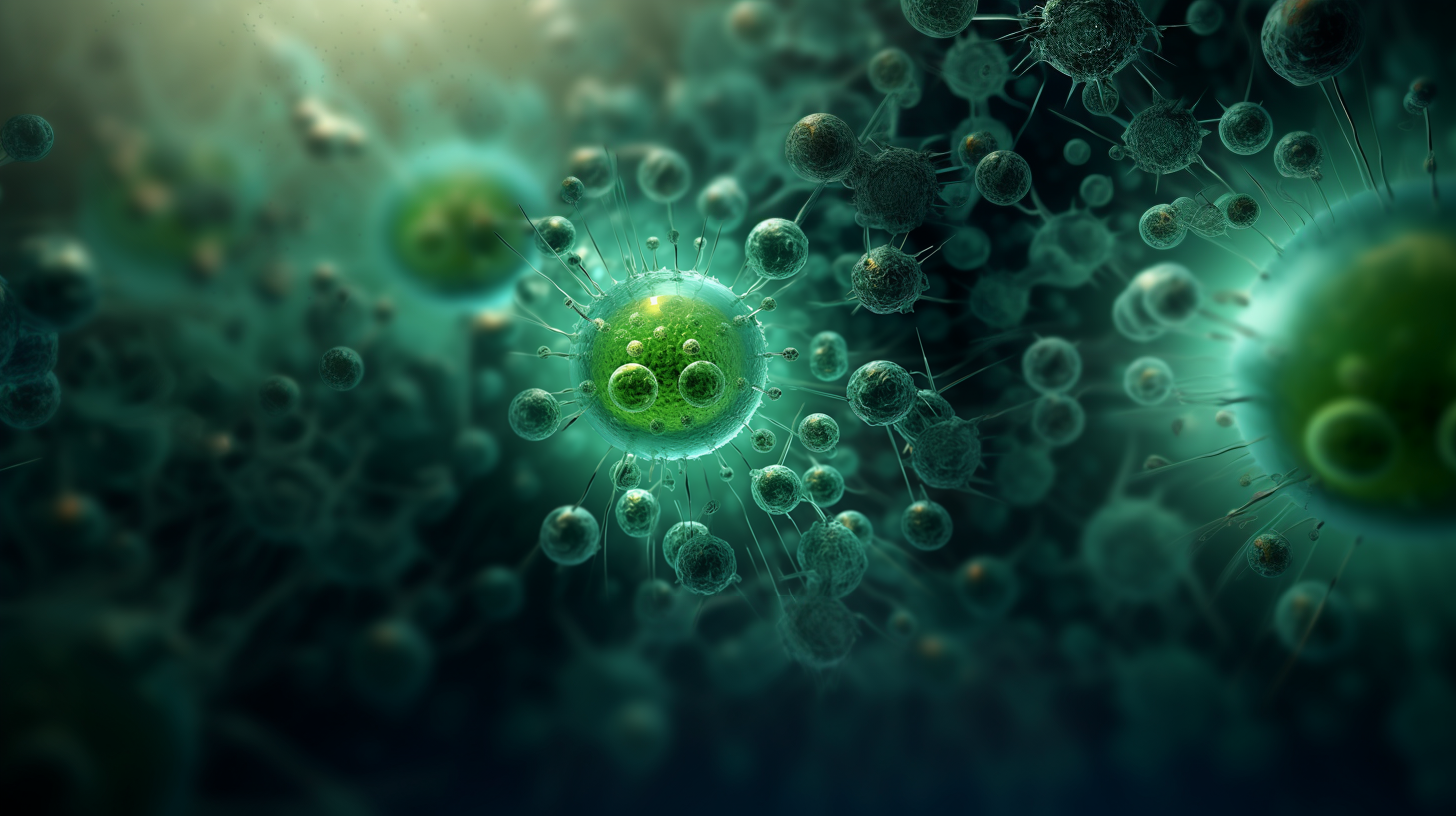
Topic World Cell Analysis
Cell analyse advanced method allows us to explore and understand cells in their many facets. From single cell analysis to flow cytometry and imaging technology, cell analysis provides us with valuable insights into the structure, function and interaction of cells. Whether in medicine, biological research or pharmacology, cell analysis is revolutionizing our understanding of disease, development and treatment options.
Topic World Particle Analysis
Particle analysis methods allow us to study tiny particles in various materials and reveal their properties. Whether in environmental monitoring, nanotechnology or the pharmaceutical industry, particle analysis gives us a glimpse into a hidden world where we can decipher the composition, size and shape of particles. Experience the fascinating world of particle analysis!

Topic World Particle Analysis
Particle analysis methods allow us to study tiny particles in various materials and reveal their properties. Whether in environmental monitoring, nanotechnology or the pharmaceutical industry, particle analysis gives us a glimpse into a hidden world where we can decipher the composition, size and shape of particles. Experience the fascinating world of particle analysis!
